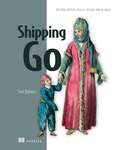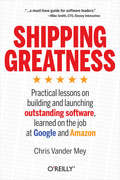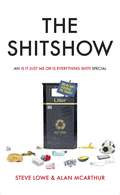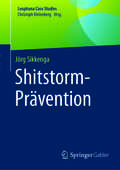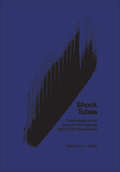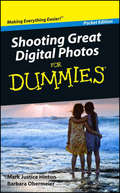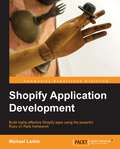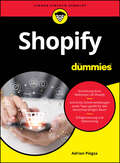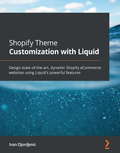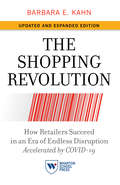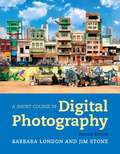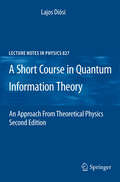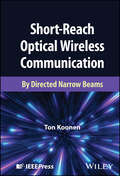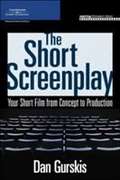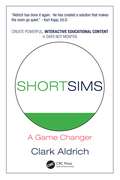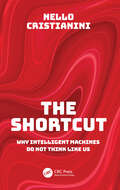- Table View
- List View
Shipping Go: Develop, deliver, discuss, design, and go again
by Joel HolmesBuild and upgrade an automated software delivery pipeline that supports containerization, integration testing, semantic versioning, automated deployment, and more.In Shipping Go you will learn how to: Develop better software based on feedback from customers Create a development pipeline that turns feedback into features Reduce bugs with pipeline automation that validates code before it is deployed Establish continuous testing for exceptional code quality Serverless, container-based, and server-based deployments Scale your deployment in a cost-effective way Deliver a culture of continuous improvement Shipping Go is a hands-on guide to shipping Go-based software. Author Joel Holmes shows you the easy way to set up development pipelines, fully illustrated with practical examples in the powerful Go language. You&’ll put continuous delivery and continuous integration into action, and discover instantly useful guidance on automating your team&’s build and reacting with agility to customer demands. Your new pipelines will ferry your projects through production and deployment, and also improve your testing, code quality, and production applications. Purchase of the print book includes a free eBook in PDF, Kindle, and ePub formats from Manning Publications. About the Technology An effective software delivery pipeline automates all stages, from initial design, through development, deployment, and ultimately the usage experience that feeds back into new features and releases. Go embraces the best practices of Continuous Delivery, and adds a few language-specific tools and twists of its own. About the Book Shipping Go shows you how to build Go-specific software development pipelines. You&’ll have a basic CI/CD process up and running by the time you finish Chapter 3, along with an iterative process for designing, releasing, and revising your applications. Then, you&’ll systematically upgrade your pipeline to support containerization, integration testing, semantic versioning, and automated deployment. A set of handy appendices help you translate these valuable practices to Kotlin, Python, and JavaScript applications. What&’s Inside Create a development pipeline that turns feedback into features Automatically validate code before it is deployed Serverless, container-based, and server-based deployments Scale your deployment in a cost-effective way About the Reader For Go developers. About the Author Joel Holmes builds cloud native applications, helping to architect, design, and develop them. A Golang tech lead, Aliénor Latour was the technical editor for this book. Table of Contents PART 1 - STARTUP 1 Delivering value 2 Introducing continuous integration 3 Introducing continuous testing 4 Introducing continuous deployment PART 2 - SCALING 5 Code quality enforcement 6 Testing frameworks, mocking, and dependencies 7 Containerized deployment PART 3 - GOING PUBLIC 8 Configuration management and stable releases 9 Integration testing 10 Advanced deployment 11 The loop
Shipping Greatness: Practical lessons on building and launching outstanding software, learned on the job at Google and Amazon
by Chris Vander MeyNeed a shortcut to a degree in shipping great software? Successful team leaders must have an extremely broad skill set to find the right product, work through a complex and ever-changing development process, and do it all incredibly quickly. In this guide, Chris Vander Mey provides a simplified, no-BS approach to the entire software lifecycle, distilled from lessons he learned as a manager at Amazon and Google.In the first part of the book, you’ll learn a step-by-step shipping process used by many of the best teams at Google and Amazon. Part II shows you the techniques, best practices, and skills you need to face an array of challenges in product, program, project, and engineering management.Clearly define your product and develop your mission and strategyAssemble your team and understand enough about systems to communicate with themCreate a beautiful, intuitive, and simple user experienceTrack your team’s deliverables and closely manage the testing processCommunicate clearly to gracefully handle requests, senior-management interactions, and feedback from various sourcesBuild metrics to track progress, spot problems, and celebrate successStick to your launch checklist and plan for marketing and PR
Shipwrecked!: An Unofficial Minecrafters Novel (Aquatic Adventures in the Overworld #5)
by Maggie MarksBrothers Mason and Asher discover an abandon shipwreck in the fifth Aquatic Adventures in the Overworld book! When Mason and Asher discover an abandoned shipwreck on the ocean floor, they begin to explore. Does the ship hold valuable loot? Maybe! But before they can claim any treasure for their own, they discover they&’re not alone. The shipwreck is home to two griefers. And now that the brothers have stumbled upon the ship, the griefers aren&’t about to let them go. Find out more in this heroic fifth book of Aquatic Adventures in the Overworld: Shipwrecked! Brothers Mason and Asher are learning how to cope with life outside the Overworld after a terrifying shipwreck that left them stranded underwater. Teamed up with their new friend Luna, they must make the choice of staying in the world they know best and risking death, or voyaging into an unknown world where anything could happen. In each story of the series for Minecrafters, follow their journey as Mason, Asher, and Luna face incredible obstacles and discover strength they never knew they had in Aquatic Adventures in the Overworld.
The Shitshow: An ‘Is It Just Me Or Is Everything Shit?' Special
by Steve Lowe Alan McArthurIt was shit. Then the shit hit the fan. Would someone find a way of making it worse? Of course they would! Welcome to THE SHITSHOW...'There's a lot going on these days. Trump, Brexit, Call the Midwife . . . The rise of the robots . . . The rise of Easy Peelers . . .The authors of the bestselling Is It Just Me Or Is Everything Shit? series present an hilarious examination of the new age, asking:~Is Donald Trump a literary character?~The AI/robot takeover: has it already happened?~Are the animals ganging up on us too?~What is an LGBT sandwich?~Would you like to make it as an influencer?~Is Brexit Britain like the 1950s, or the 1930s, or, er, the 780s?~What is 5G?~What is consciousness?~Do you need a smart toilet?~Are you stronger than clickbait?Just get on with it!Whatever 'it' is.
The Shitshow: An ‘Is It Just Me Or Is Everything Shit?' Special
by Steve Lowe Alan McArthurIt was shit. Then the shit hit the fan. Would someone find a way of making it worse? Of course they would! Welcome to THE SHITSHOW...'There's a lot going on these days. Trump, Brexit, Call the Midwife . . . The rise of the robots . . . The rise of Easy Peelers . . .The authors of the bestselling Is It Just Me Or Is Everything Shit? series present an hilarious examination of the new age, asking:~Is Donald Trump a literary character?~The AI/robot takeover: has it already happened?~Are the animals ganging up on us too?~What is an LGBT sandwich?~Would you like to make it as an influencer?~Is Brexit Britain like the 1950s, or the 1930s, or, er, the 780s?~What is 5G?~What is consciousness?~Do you need a smart toilet?~Are you stronger than clickbait?Just get on with it!Whatever 'it' is.
The Shitshow: An ‘Is It Just Me Or Is Everything Shit?' Special
by Steve Lowe Alan McArthurIt was shit. Then the shit hit the fan. Would someone find a way of making it worse? Of course they would! Welcome to THE SHITSHOW...'There's a lot going on these days. Trump, Brexit, Call the Midwife . . . The rise of the robots . . . The rise of Easy Peelers . . .The authors of the bestselling Is It Just Me Or Is Everything Shit? series present an hilarious examination of the new age, asking:~Is Donald Trump a literary character?~The AI/robot takeover: has it already happened?~Are the animals ganging up on us too?~What is an LGBT sandwich?~Would you like to make it as an influencer?~Is Brexit Britain like the 1950s, or the 1930s, or, er, the 780s?~What is 5G?~What is consciousness?~Do you need a smart toilet?~Are you stronger than clickbait?Just get on with it!Whatever 'it' is.
Shitstorm-Prävention
by Jörg SikkengaDas Buch stellt die Gefahr von Shitstorms dar, die schnell in Sozialen Medien aufziehen und Unternehmen schaden können. Die Sozialen Medien oder das Web 2.0 stellen eine besondere Herausforderung für das Marketing dar, da die Konsumentinnen und Konsumenten Rückmeldung zu den gekauften Produkten geben und damit reale sowie vermeintliche Missstände anprangern können. Darauf muss die Unternehmenskommunikation reagieren. Für Unternehmen wäre es ein Worst-Case-Szenario, wenn ein Shitstorm seinen Ruf nachhaltig schädigt und intensive Marketingbemühungen verpuffen lassen würde. Die Case Study behandelt das Thema Shitstorm-Attacken auf zwei Ebenen. So diskutiert sie auf der ersten Ebene die Möglichkeiten der Shitstorm-Prävention des Unternehmens, aus denen dann eine Präventionsstrategie erarbeitet wird. Auf der zweiten Ebene wird anhand eines Beispiels ein Plan entwickelt, mit dem ein Shitstorm beruhigt werden kann. Beide Strategien können von Unternehmen eingesetzt werden, um sowohl Shitstorms vorzubeugen als auch diese frühzeitig zu minimieren.Die Leuphana Case Studies sind ein Projekt, das in Zusammenarbeit mit kleinen und mittelständischen Unternehmen erstellt und entwickelt worden ist. Sie sind ein Lehrbuch, mit dessen Hilfe Unternehmen, die vor ähnlichen Herausforderungen stehen, selbige bewältigen können. Dafür ist keine Hilfe von Dritten notwendig. Auf Grundlage der einzelnen Case Studies werden den Bearbeiterinnen und Bearbeitern elementare Werkzeuge aus der wissenschaftlichen Theorie erklärt. Diese können sie anwenden, um mit den Insiderkenntnissen des eigenen Unternehmens Prozesse zu optimieren, Ziele entwickeln und erreichen oder schwierige Herausforderungen zu bewältigen.
Shock Tubes: Proceedings of the Seventh International Shock Tube Symposium held at University of Toronto, Toronto, Canada 23-25 June 1969
by Irving Israel GlassThis volume contains the proceedings of a symposium held at the University of Toronto in June 1969. The symposium consisted of six sessions; each containing an invited paper, followed by six contributed papers reporting on recent, relevant research and development. The topics are: a review of research problems in basic shock tube flows and the possibilities for the shock tube in the future; driving techniques; explosive drivers; theoretical and experimental research in electromagnetic shock tubes; chemical kinetics and spectroscopy; and a review of shock tube diagnostics, instrumentation and fundamental data as well as the measurement of physical quantities.
Shooting Great Digital Photos For Dummies, Pocket Edition
by Mark Justice Hinton Barbara ObermeierMake your photos better than ever with these great tips! Photography is fun, and thebetter your photos, the morefun you'll have. This little bookis packed with advice to help you set up super shots, make the most of lighting, explore exposure, and sharpen your focus. Learn to take advantage of your camera's settings, and watch your confidence grow as your images improve. Open the book and find: Creative ways to play with lighting All about getting close-up shots How to focus on a moving target Composition tips Things you should know when using manual mode
Shopify
by Jonathan S. Walker Sophie RealJ’ai grandi en Californie, aux États-Unis, et j’ai grandi là-bas durant la plupart de mes années. Lorsque j’étais jeune, j’ai été exposé à beaucoup de personnes différentes et à beaucoup d’opportunités, ce qui m’a donné l’envie de m’efforcer à devenir un entrepreneur afin d’échapper de la route de la foire d’empoigne, que la plupart de mes paires ont emprunté. Je savais que je voulais être capable de voyager et de découvrir le monde, de la façon ou il devait être vu, et c’est ce que j’ai fait. J’ai voyagé dans la plupart des destinations dans le monde, et c’est certain que je profite chaque instant. Lorsque j’ai du temps libre, j’adore jouer au tennis et croyez-moi ou non, de composer des chansons. Je vous souhaite le meilleur pour vos efforts, et que vos rêves, peu importe ce qu’ils sont, se réalisent avec abondance, dans un future proche.
Shopify Application Development
by Michael LarkinThis is an easy-to follow manual that will guide you through the entire process of application development with Shopify, beginning with the installation and configuration of your local development environment for your app to the deployment of the app to Heroku. If you are a web developer or a designer who wants to extend Shopify stores by building apps, then this book is for you. A basic understanding of programming concepts and some familiarity with Shopify is all that is required to get started with Shopify app development.
Shopify - Crie o Seu Próprio Império de Negócio Online Lucrativo!
by Jonathan S. WalkerParabéns por adquirir a sua cópia pessoal do Shopify: Crie o Seu Próprio Império de Negócio Online Lucrativo! (Ganhe Dinheiro a Partir de Casa, Shopify, Dropshipping, Amazon FBA). Obrigado por o ter feito. Este livro vai-lhe fornecer todas as informações de que precisa sobre três tipos de ferramentas que pode aprender a utilizar para ganhar mais dinheiro a partir de casa. Estes três métodos incluem a Shopify, o dropshipping e o Amazon FBA. Depois de aprender mais sobre cada um dos métodos apresentados neste livro, vai ter todas as informações de que precisa para começar a trabalhar em direção ao seu objetivo de se tornar um empreendedor online. Estas táticas não são complexas; no entanto, muitas pessoas utilizam estes possíveis fluxos de receita incorretamente. Este livro vai ajudá-lo a utilizar estas várias ferramentas corretamente. É por isso que este livro é importante. O último capítulo deste livro será sobre como usar o Amazon FBA como uma forma de ganhar dinheiro. Depois de ler este livro, irá ficar um passo à frente do jogo, no sentido de que irá estar menos propenso a cometer erros, e mais propenso a tirar partido do que leu para aumentar os seus ganhos e ter um bom resultado final. Mais uma vez, obrigado por ter adquirido este livro, Shopify: Crie o Seu Próprio Império de Negócio Online Lucrativo! (Ganhe Dinheiro a Partir de Casa, Shopify, Dropshipping, Amazon FBA). Aproveite o que ele tem para oferecer!
Shopify für Dummies (Für Dummies)
by Adrian PiegsaIn kürzester Zeit erfolgreich auf Shopify Mit Shopify bauen Sie Ihren eigenen Online-Shop, der perfekt zu Ihren Bedürfnissen passt. Adrian Piegsa gibt Ihnen einen Überblick über die Shop-Plattform, zeigt Ihnen, wie Sie sich zurechtfinden und worauf Sie achten müssen. Sie lernen Schritt für Schritt, wie Sie Ihren Webshop mit Kategorien und Produkten anlegen, Bestellungen abwickeln und Ihren Erfolg optimieren. Darüber hinaus erfahren Sie alles über Vertriebs- und Werbemöglichkeiten von Shopify und erhalten Tipps und Tricks im Umgang mit der Software ? speziell für den deutschsprachigen Raum. Sie erfahren Wie Sie sich auf Shopify zurechtfinden Was eine gute Shop-Struktur ausmacht Wie Sie Shopify-Apps sinnvoll nutzen Wie Sie Ihre Statistiken einsehen und auswerten
Shopify Theme Customization with Liquid: Design state-of-the-art, dynamic Shopify eCommerce websites using Liquid's powerful features
by Ivan DjordjevicDiscover how to customize Shopify themes for your eCommerce websites with powerful tools and Liquid templatesKey FeaturesGet to grips with the Liquid core to build a solid foundation for working on any Shopify themeUse JSON to create Shopify's famous modular sections with powerful and complex functionalitiesUtilize the Shopify Ajax API to implement advanced functionality and make your eCommerce stores more dynamicBook DescriptionShopify is one of the fastest-growing eCommerce platforms, which means developers familiar with the Liquid concept are needed now more than ever. This book will help you to build a solid foundation by enabling you to develop your skills from the ground up by gaining essential theoretical knowledge of Liquid and putting that knowledge to use through hands-on projects.Shopify Theme Customization with Liquid begins by helping you get to grips with basic Shopify information, its interface and theme structure, setting up your Partner account, and creating a child theme, which is essential when preparing for any future work on Shopify. You'll then explore Liquid core features that will provide you with a basic understanding of the Liquid programming logic needed to develop any feature. As you advance to the latest and advanced features, you'll learn about JSON settings, allowing you to create any type of static or dynamic section - a must-have for becoming a competent Shopify developer. Finally, the book takes you through the Shopify Ajax API to gain the necessary skills needed to create a variety of dynamic features and content.By the end of this Shopify book, you'll be able to take on challenging projects to showcase your theme customization expertise to your future employer.What you will learnDiscover how to use logic and data comparison operators for various types of data within LiquidUse Liquid core features such as objects, tags, and filtersFind out how to customize themes using JSON settingsUse metafield objects to generate unique content on any pageUnderstand how to output the local or external media contentUse Shopify's famous drag-and-drop feature to rearrange sections on a storefrontTake Shopify's dynamic functionality to a whole new level using REST API endpointsWho this book is forThis book is for beginners and experienced CMS developers who want to learn about working with Shopify themes and customizing those themes using Liquid. Web developers designing professional e-commerce websites will also find this book useful. Besides familiarity with standard web technologies (HTML, CSS, and JavaScript), this book requires no prior knowledge of Shopify or Liquid. The book covers everything from Shopify fundamentals and the core of the Liquid and REST APIs, all the way through to the latest Liquid features that may be new to even proficient developers.
The Shopping Revolution: How Successful Retailers Win Customers in an Era of Endless Disruption
by Barbara E. KahnAmazon disrupts everything it touches and upends any market it enters. In the era of its game-changing dominance, how can any company compete? We are just witnessing the start of the radical changes in retail that will revolutionize shopping in every way. As Amazon and other disruptors continue to offer ever-greater value, customers’ expectations will continue to ratchet up, making winning (and keeping) those customers all the more challenging. For some retailers, the changes will push customers permanently out of their reach—and their companies out of business. In The Shopping Revolution, Barbara E. Kahn, a foremost retail expert and professor at The Wharton School, examines the companies that have been most successful during this wave of change, and offers fresh insights into what we can learn from their ascendance. How did Amazon become the retailer of choice for a large portion of the US population, and how can other companies work with them or compete with them?How did Walmart beat out other grocers in the late 1990s to become the leader in food retailing, and how must they pivot to hold their leadership position today?How did Warby Parker make a dent in the once-untouchable Luxottica's lucrative eyewear business, and what can that tell start-ups about how to unseat a Goliath?How did Sephora draw customers away from once-dominant department stores to become the go-to retailers for beauty products, and what can retailers learn from their success?How are luxury and fast-fashion retailers competing in the ever-changing, fickle world of fashion?Building on these insights, Kahn offers a framework that any company can use to create a competitive strategy to survive and thrive in today’s—and tomorrow’s—retail environment.The Shopping Revolution is a must-read for those in the retailing business who want to develop an effective strategy, entrepreneurs looking at starting their own business, and anyone interested in understanding the changing landscape in which they are shopping.
The Shopping Revolution, Updated and Expanded Edition: How Retailers Succeed in an Era of Endless Disruption Accelerated by COVID-19
by Barbara E. KahnFeatured in The New York Times, Bloomberg, and Vox, The Shopping Revolution is “a brisk and thought-provoking anatomy of shopping in the 21st century” (Kirkus Reviews).The retail industry was already in the midst of unparalleled disruption. Then came COVID-19.In a fully updated and expanded edition of The Shopping Revolution: How Retailers Succeed in an Era of Endless Disruption Accelerated by COVID-19, Wharton professor Barbara E. Kahn, a foremost retail expert, examines the companies that have been most successful during a tsunami of change in the industry. She offers fresh insights into what we can learn from these companies’ ascendance and continued transformation in the face of unprecedented challenges. Kahn, also the author of Global Brand Power: Leveraging Branding for Long-Term Growth, examines:In a brand-new chapter, how companies in China, like Alibaba, JD.com, and Pinduoduo have changed the game;How Amazon became the retailer of choice for a large portion of the US population, and how other companies have chosen to work with them or have to compete against them; How Walmart beat out other grocers in the late 1990s to become the leader in food retailing, and how they must pivot to hold their leadership position today; How Warby Parker dared to compete against Luxottica in the lucrative eyewear business, and what that can tell start-ups about how to carve out a niche against a Goliath; How Sephora drew away customers from once-dominant department stores to become the go-to retailers for beauty products. Kahn argues we are just witnessing the start of the radical changes in retail that have been hastened by the pandemic and will revolutionize shopping in every way. Building on these insights, Kahn offers a framework that any company can use to create a competitive strategy to survive and thrive in today’s—and tomorrow’s—retail environment.
A Short Course in Computational Science and Engineering
by David YevickBuilding on his highly successful textbook on C++, David Yevick provides a concise yet comprehensive one-stop course in three key programming languages, C++, Java and Octave (a freeware alternative to MATLAB). Employing only public-domain software, this book presents a unique overview of numerical and programming techniques, including object-oriented programming, elementary and advanced topics in numerical analysis, physical system modelling, scientific graphics, software engineering and performance issues. Compact, transparent code in all three programming languages is applied to the fundamental equations of quantum mechanics, electromagnetics, mechanics and statistical mechanics. Uncommented versions of the code that can be immediately modified and adapted are provided online for the more involved programs. This compact, practical text is an invaluable introduction for students in all undergraduate- and graduate-level courses in the physical sciences or engineering that require numerical modelling, and also a key reference for instructors and scientific programmers.
A Short Course in Digital Photography, 2nd Edition
by Barbara London Jim StoneFor introductory, one-semester courses devoted to digital photography. After a very successful first edition, this second edition returns with the most up-to-date industry knowledge. Modeled after the long-running and widely used A Short Course in Photography, a brief text which presents the medium entirely in its most updated form.
A Short Course in Photography: Digital
by Jim Stone Barbara LondonModeled after the widely used A Short Course in Photography:Film and Darkroom, the third edition of A Short Course in Photography: Digital presents photography entirely in its current, electronic form. This brief title demonstrates greater emphasis on the most up-to-date learning techniques, allowing students to keep up with modern technology. A Short Course in Photography: Digital teaches readers to emphasize their choices in picture making by presenting in depth basic techniques of photography. In additional to covering the basic techniques of photography, this title covers the impact of computers on this important art form.
A Short Course in Quantum Information Theory: An Approach From Theoretical Physics (Lecture Notes in Physics #827)
by Lajos DiosiThis short and concise primer takes the vantage point of theoretical physics and the unity of physics. It sets out to strip the burgeoning field of quantum information science to its basics by linking it to universal concepts in physics. An extensive lecture rather than a comprehensive textbook, this volume is based on courses delivered over several years to advanced undergraduate and beginning graduate students, but essentially it addresses anyone with a working knowledge of basic quantum physics. Readers will find these lectures a most adequate entry point for theoretical studies in this field. For the second edition, the authors has succeeded in adding many new topics while sticking to the conciseness of the overall approach. A new chapter on qubit thermodynamics has been added, while new sections and subsections have been incorporated in various chapter to deal with weak and time-continuous measurements, period-finding quantum algorithms and quantum error corrections. From the reviews of the first edition: "The best things about this book are its brevity and clarity. In around 100 pages it provides a tutorial introduction to quantum information theory, including problems and solutions. ... it's worth a look if you want to quickly get up to speed with the language and central concepts of quantum information theory, including the background classical information theory." (Craig Savage, Australian Physics, Vol. 44 (2), 2007)
Short-Reach Optical Wireless Communication: By Directed Narrow Beams
by Ton KoonenA deep dive into indoor optical wireless communication networks In Short-Reach Optical Wireless Communication: By Directed Narrow Beams, distinguished researcher Ton Koonen delivers an in-depth discussion of the design of indoor optical wireless networks and their key functions. The book explores the steering function for directing beams two-dimensionally to devices, the localization function for device finding and the receive function for devices in order to maximize the range of angles and aperture through which light can be captured. These functions have been analyzed, designed, realized, and validated, as well as integrated in a laboratory setting for proof of concept of bidirectional all-optical wireless communication. The book also includes: A thorough introduction to how key optical wireless communication techniques are realized and validatedIllustrative examples of optical wireless technologyPractical discussions of foundational concepts that underlie optical wireless communication and its expected benefits, and a comparison with radio wireless techniquesA large collection of figures, including photos of experimental setups, layouts of system concepts, and optical system modelling based on ray tracing analysis using MATLAB Perfect for academic and industrial researchers with an interest in optical wireless communication, Short-Reach Optical Wireless Communication: By Directed Narrow Beams will also benefit professionals working and studying in the areas of optical communication modules and systems.
The Short Screenplay: Your Short Film from Concept to Production
by Dan GurskisWith the growth of film festivals, cable networks, specialty home video, and the Internet, there are more outlets and opportunities for screening short films now than at any time in the last 100 years. But before you can screen your short film, you need to shoot it. And before you can shoot it, you need to write it. The Short Screenplay provides both beginning and experienced screenwriters with all the guidance they need to write compelling, filmable short screenplays. Explore how to develop characters that an audience can identify with. How to create a narrative structure that fits a short time frame but still engages the audience. How to write dialogue that's concise and memorable. How to develop story ideas from concept through final draft. All this and much more is covered in a unique conversational style that reads more like a novel than a "how-to" book. The book wraps up with a discussion of the role of the screenplay in the production process and with some helpful (and entertaining) sample scripts. This is the only guide you'll ever need to make your short film a reality!
Short Season
by Scott Eller[from the back cover] "Striking Out For Brad, it's always been great having an older brother like Dean--to play stickball with, to have as a buddy or just to talk to. And on the baseball field, Dean's golden glove and Brad's hitting eye can't be beat. They're more than brothers--they're a team. But Dean's been acting different lately, and Brad doesn't know why. He hardly talks to Brad anymore--all of a sudden he's just too busy. Things are bad enough, but the league play-offs are coming up, and Brad doesn't have Dean to cover for him in the outfield anymore. Brad's spent his life being part of a team--can he really make it on his own?"
Short Sims: A Game Changer
by Clark AldrichShort Sims: A Game Changer explores the design concepts, dialogue, and formatting of interactive simulations. Interactivity is the key to effective educational media in schools, corporations, the military, and government. However, challenges like ineffective linear content or expenses can derail the product. This book provides a proven methodology to guide anyone through the steps of quickly creating highly engaging and responsive content. The process combines decades of research and implementations with leading organizations (Bill & Melinda Gates Foundation, Harvard Business School Publishing, Visa, State Department) with new tools that have just emerged. Key Features This book provides numerous code examples to illustrate how to put the techniques into practice. It includes expanded introductions to mathematics fundamental to computer graphics and game development. Graphics and physics are covered in introductory overviews. Author Bio Clark Aldrich is an education technology thought leader—the author of six books and developer of patent and award-winning projects. He currently builds custom Short Sims for organizations using a revolutionary methodology he has pioneered, or helps them build their own, through www.shortsims.com. He is also the host of an audio series called Education X Media (www.edbymedia.com) about evolving pedagogy in academics, corporations, and the military. He has been called a "guru" by Fortune Magazine and a "maverick" by CNN. Aldrich and his work have been featured in hundreds of other sources, including CBS, ABC, The New York Times, USA Today, the Associated Press, Wall Street Journal, NPR, CNET, Business 2.0, BusinessWeek, and U.S. News and World Report. He has written monthly columns for Training Magazine and Online Learning Magazine. Previously, he was the founder and former director of research for Gartner’s e-learning coverage. Earlier in his career, he worked on special projects for Xerox' executive team. He also served for many years as the Governor's representative on the education task force Joint Committee on Educational Technology, volunteered on several non-profit organizations aimed at child advocacy, and has served on numerous boards. He earned from Brown University a degree in cognitive science (during which he also taught at a leading environmental education foundation). He grew up in Concord, Massachusetts, and is the ninth great-grandson of Governors John Winthrop and Thomas Dudley, first and second governors of the Massachusetts Bay Colony, and Captain Walter Neale, the first colonial governor of lower New Hampshire.
The Shortcut: Why Intelligent Machines Do Not Think Like Us
by Nello CristianiniAn influential scientist in the field of artificial intelligence (AI) explains its fundamental concepts and how it is changing culture and society.A particular form of AI is now embedded in our tech, our infrastructure, and our lives. How did it get there? Where and why should we be concerned? And what should we do now? The Shortcut: Why Intelligent Machines Do Not Think Like Us provides an accessible yet probing exposure of AI in its prevalent form today, proposing a new narrative to connect and make sense of events that have happened in the recent tumultuous past, and enabling us to think soberly about the road ahead.This book is divided into ten carefully crafted and easily digestible chapters. Each chapter grapples with an important question for AI. Ranging from the scientific concepts that underpin the technology to wider implications for society, it develops a unified description using tools from different disciplines and avoiding unnecessary abstractions or words that end with -ism. The book uses real examples wherever possible, introducing the reader to the people who have created some of these technologies and to ideas shaping modern society that originate from the technical side of AI. It contains important practical advice about how we should approach AI in the future without promoting exaggerated hypes or fears.Entertaining and disturbing but always thoughtful, The Shortcut confronts the hidden logic of AI while preserving a space for human dignity. It is essential reading for anyone with an interest in AI, the history of technology, and the history of ideas. General readers will come away much more informed about how AI really works today and what we should do next.
